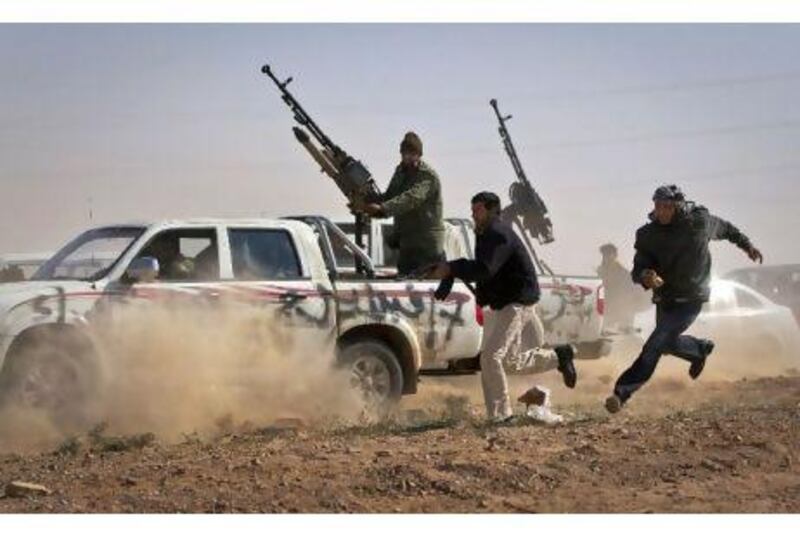Heavy fighting raged for control of a key Libyan town yesterday and another high-level diplomat has split with the regime of Col Muammar Qaddafi, signalling further cracks in his inner circle.
The oil hub of Brega was again a battleground yesterday with both the rebels and Qaddafi loyalists advancing into the town only to retreat under heavy fire.
On Saturday, the rebels had claimed to have recaptured Brega, 800 kilometres east of the Qaddafi stronghold Tripoli, but yesterday said they were forced to make a tactical retreat. By last night the town remained a no-man's land.
Most of the rebel volunteers acknowledged they had neither the military training nor the knowledge of the terrain to mount a victorious assault on Brega. They said they were dependent on the rebels' few trained fighters, most of them defectors from the regular army.
"There is no commander," said Abdul Wahed Aguri, a 28-year-old volunteer. "We are not army. We can't move closer to Brega because we don't know where the enemy is," he said.
Meanwhile, the former Libyan foreign minister and UN general assembly president, Ali Treiki, resigned his official duties as an adviser to Col Qadhafi but did not pledge allegiance to the rebels, Arab League sources said.
Mr Treiki is the second senior official to resign this week, after the defection of foreign minister and Qaddafi regime stalwart Mussa Kussa.
Mr Kussa arrived in Britain from Tunisia on Wednesday, dealing a major blow to the Libyan regime as it faced a western-led aerial assault backed by a UN Security Council resolution authorising the protection of civilians by all means.
Analysts in London said yesterday that Mr Kussa could hold the key to persuading other key regime figures to defect, but warned that the Libyan leader's close-knit inner circle of family and clan members is unlikely to be brought down by the defection of a handful of ministers.
The interviews with Mr Kussa, a former head of Libyan intelligence, who is described as Qaddafi's "black box" by opposition groups, were being conducted in the utmost secrecy, although his state of mind was said to be fragile.
At least one senior African leader believes some concessions should be made to remove Col Qaddafi. Former Archbishop Desmond Tutu, a leader in the fight against South Africa's white-minority regime who won the Nobel Prize for his stand against apartheid, yesterday told the BBCi: "You keep having to balance what is a lesser evil."
"It's quite clear in the best of worlds it would be a good thing for us to say you clobber him, capture him and let him stand for trial," Mr Tutu said. He added that "the lesser of two evils" could be to let Col Qadaffi "have a soft landing and save the lives of as many people as you possibly can".
Also yesterday, Nato responded to charges from a chief rebel spokesman that coalition warplanes had killed 13 people, four of them civilians, in an air raid 15 kilometres east of Brega on Friday. A spokeswoman for Nato, which leads the international coalition enforcing the no-fly zone over Libya and protecting civilians from attack, said the alliance was examining the reports.
* With reporting from Agence France-Presse and Reuters





